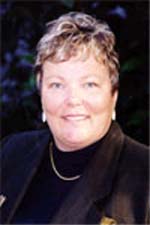 |


|
|
The Hazards of Leading Us
Your motives are suspect. Your income is ill-gotten. Your personal life disqualifies you. Your ego is too big. (Imagine, thinking you can improve things!) You must have something to hide. You've stolen some of your ideas. You've left someone out. You're making "straight" people like us less or criticize us more. You're taking too long or moving too quickly. You've failed. We do this. We do it often, and many of us seem to find our stride in doing this. We take on an air of righteous indignation when we do. This cause becomes our life instead of creating positive alternatives. It's classic victim role activity. Any group that has been victimized by the larger society is also taught to live as victims. Since taking on the dominant group might bring more oppression or at least make the dominant group like us less - and the victim role teaches us to live so that they will like us and validate us -- it's easier to pick on each other and eat our own.
It's the reason I recommend to anyone that tries to lead that they do so for what they personally will get out of it. Forget the idea that this is selfish. Leadership begins when you see a need to end something that is hurting you. And ending what's hurting you as a human being will benefit everyone. If I lead to help those other people, I'll feel quite charitable for a while but I'll soon learn that victimized people seldom have much personal space to say thank you. They're still fighting their own oppression. They have so much healing of their personal hurts to do, that they have a hard time accepting what is done at face value. They've been so hurt by the motives and actions of others that they begin with the expectation that this will be more of the same. And, even more than most Americans, they have a difficult time beginning with the assumption that people who lead and seem to do so successfully have good intentions, are trying their best, and will make mistakes. The first thing someone in the victim role does when there appears to be some problem with the activities of a leader, is what psychologists call "triangulation." Instead of going directly to the leader and asking them what they meant to do, assuming they meant well, the victim role finds others to discuss the issue and agree with them that the leader has done something evil.
First, we would be facing, not denying, our own internal issues so we were not acting out of our past hurts. When we can take a relaxed, learning stance toward things, instead of reacting, even over-reacting, to others, when we can assume the best of our leaders until we have spoken with them, we are not living as victims who are reacting to what the leaders do. Second, we can assume the best of our leaders until we have personally heard their side of the story. When we don't assume the best, we are reacting to our own past experiences, not present realities. We react negatively to protect ourselves because we don't want to be hurt, ridiculed, abandoned, or have our hopes destroyed again. Assuming they will again now, we don't go to the leaders asking, "Help me understand this." We've already made our judgments. Third, we will allow our leaders to make mistakes. If we expect our leaders to wait till they will do something perfectly, we'll get nothing done. As Melody Beattie, the author of numerous books on codependency, puts it: "Perfectionism leads to procrastination, leads to paralysis." In most cases, something done ineloquently is actually better than nothing. Fourth, we would always follow with the next thought: What can I do to make this better? Should I offer to help? Should I offer other support to the over-worked? Should I begin my own movement to provide an alternative but not one motivated by just being against the other? We can step out of the victim role to use our energies to end the oppression of LGBT people or we can fight among ourselves while the same old society grinds on. It's our choice. Besides, choosing to change our attitudes toward our leaders could actually support them to lead us more effectively. Robert N. Minor, Ph.D. is author of Scared Straight: Why It's So Hard to Accept Gay People and Why It's So Hard to Be Human and Professor of Religious Studies at the University of Kansas. He may be reached at www.fairnessproject.org |

© 1997-2002 BEI
 Elizabeth Birch heads the Human Rights Campaign, one of the gay community's most influential groups in Washington. But despite a positive track record, the group and Birch have always faced criticism from within the gay community.
Elizabeth Birch heads the Human Rights Campaign, one of the gay community's most influential groups in Washington. But despite a positive track record, the group and Birch have always faced criticism from within the gay community.  Lorri L. Jean, the new head of the National Gay & Lesbian Task Force, is no stranger to being in the hot seat of gay leadership. From 1993-1999 she led the Gay & Lesbian Community Center of Los Angeles.
Lorri L. Jean, the new head of the National Gay & Lesbian Task Force, is no stranger to being in the hot seat of gay leadership. From 1993-1999 she led the Gay & Lesbian Community Center of Los Angeles.